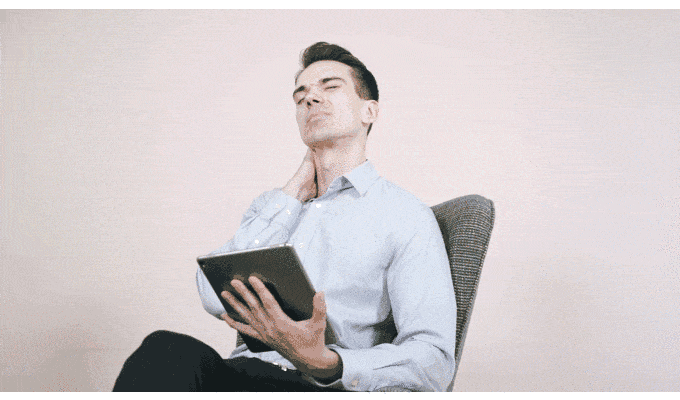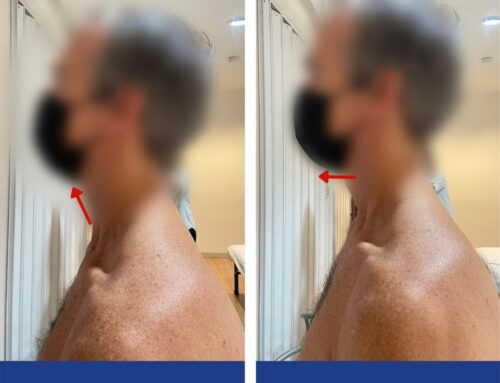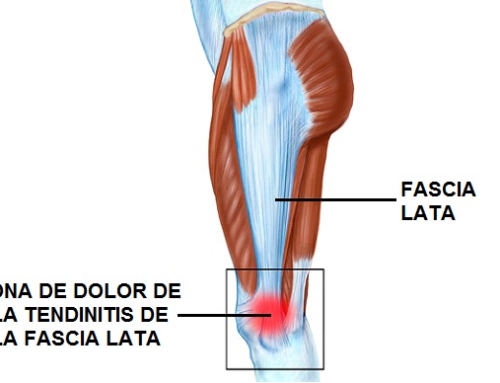Neck pain due to stress
Currently, as a result of the pandemic, many people have adapted their daily routines to sitting, most of the time, in front of a computer, cell phone or tablet. The hours go by, and usually they ignore that their heads are facing forward. When the head is not aligned with the rest of the body, there is more stress on the neck or cervical spine causing cervical pain.
What is stress pain in the neck?
Neck pain associated with stress is usually more intense at the end of the day. As the workday progresses, the neck becomes increasingly tense and the muscles tend to shorten. Occasionally, dizziness or headaches may appear, either with sweating and nausea or simply everything spinning around.

Another typical manifestation is the loss of mobility in all positions and that the patient must look as if they were "robots", being unable to rotate the neck. If the contracture is really important, there is often a cramping and tingling sensation in the arms or hands.
Recommendations for relief
Exercise
With exercise, the quality of sleep will be better, mentally you will be able to make better decisions. It can include personalized physical work to strengthen the cervical musculature through the use of rubber bands and supervised by a personal trainer.
Muscle relaxants
It is the chemical option. As its name indicates, the function is to eliminate the contracture of the main muscles such as the trapezius and splenius and reduce the anxiety that causes it. Always remember to consult a doctor about the possible side effects of any medication.
Physiotherapy
It helps to unload the contracture manually and with the help of technology, especially for those who have chronic neck pain. Following the specialist's recommendations to perform daily activities correctly is also an important part of the preventive process.
If the clinical condition requires a more detailed assessment, one or more of the following examinations may be required: CT, MRI or an Electromyogram which is the study of nerve conduction by means of several very fine needles, which capture nerve potentials and transmit them to a screen. In order to achieve a deep analysis, the best option is to go to a specialist and undergo the corresponding tests and therapies.
Currently, as a result of the pandemic, many people have adapted their daily routines to sitting, most of the time, in front of a computer, cell phone or tablet. The hours go by, and usually they ignore that their heads are facing forward. When the head is not aligned with the rest of the body, there is more stress on the neck or cervical spine causing cervical pain.
What is stress pain in the neck?
Neck pain associated with stress is usually more intense at the end of the day. As the workday progresses, the neck becomes increasingly tense and the muscles tend to shorten. Occasionally, dizziness or headaches may appear, either with sweating and nausea or simply everything spinning around.

Another typical manifestation is the loss of mobility in all positions and that the patient must look as if they were "robots", being unable to rotate the neck. If the contracture is really important, there is often a cramping and tingling sensation in the arms or hands.
Recommendations for relief
Exercise
With exercise, the quality of sleep will be better, mentally you will be able to make better decisions. It can include personalized physical work to strengthen the cervical musculature through the use of rubber bands and supervised by a personal trainer.
Muscle relaxants
It is the chemical option. As its name indicates, the function is to eliminate the contracture of the main muscles such as the trapezius and splenius and reduce the anxiety that causes it. Always remember to consult a doctor about the possible side effects of any medication.
Physiotherapy
It helps to unload the contracture manually and with the help of technology, especially for those who have chronic neck pain. Following the specialist's recommendations to perform daily activities correctly is also an important part of the preventive process.
If the clinical condition requires a more detailed assessment, one or more of the following examinations may be required: CT, MRI or an Electromyogram which is the study of nerve conduction by means of several very fine needles, which capture nerve potentials and transmit them to a screen. In order to achieve a deep analysis, the best option is to go to a specialist and undergo the corresponding tests and therapies.





